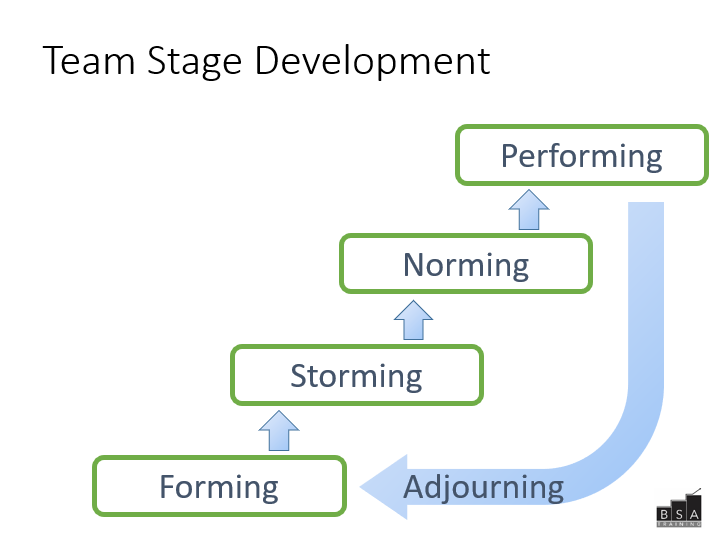It is based on the work of Bruce Tuckman and focuses on the way in which a team develops over time from the initial formation of the team through to the completion of the project or the achievement of the objectives.
He suggests that a team will go through 4 distinct stages.

Stage 1 – Forming
The team is assembled and the task is allocated. Team members tend to behave independently, and although goodwill may exist, they do not know each other well enough to unconditionally trust one another. Time is spent planning, collecting information and bonding.
Stage 2 – Storming
Despite its label, this need not involve actual fighting or aggression. Different ideas may compete for ascendancy and if badly managed this phase can be very destructive for the team. It is the realisation stage, where team members become clearer about individual abilities and preferences.
Stage 3 – Norming
As the team moves out of the Storming phase they will enter the Norming phase. This tends to be a move towards harmonious working practices with teams agreeing on the rules and values by which they operate. This is where the group decides ground rules, developing the way in which things get done in the team, and what is and what is not acceptable
Stage 4 – Performing
At this stage the team can get on and achieve its objectives with minimal interference from interpersonal stresses or disruptions caused by the preceding stages. Trust, openness, honesty, co-operation, discussion and a continuous review of results become part of the way of life. Above all, the team is working as one, and people take a pride in what they do. They feel valued and believe that their efforts make a difference.
So, at what stage is your team now ?
The following is a list of guiding questions to help you to identify the stage of development:
Stage 1 – Forming
- Who initiated the formation of the team?
- What is the team intended to accomplish?
- Have members described their personal reasons for participating in the team?
- Is it clear how individuals will be rewarded and recognized for participating in the team?
Stage 2 – Storming
- Is there a shared understanding of the overarching outcomes and purposes?
- Is there an open forum for members to discuss their feelings, thoughts and ideas?
- Is the team willing to discuss topics that are potentially embarrassing or threatening to team members?
- Does the team reflect on its tasks and interrelationships ?
Stage 3 – Norming
- Are the team goals clear, specific and measurable?
- Are members of the team enthusiastic about its purpose?
- Are team members clear about their individual responsibilities?
- Does the team have a formal method of communication?
Stage 4 – Performing
- Does the team give itself high ratings in terms of effectiveness?
- Do all team members share the responsibility’ and feel that they are “all in it together”?
- Are new ideas being generated?
- Do they hold periodic reviews to assess progress and make refinements to their approach?
So, as Leader, how can you support your team during each of the four recognised stages?
In Stage 1 – Forming. You need to:
- Create the team’s identity.
- Communicate the team’s objectives.
- Give people time and the opportunity to get to know each other.
- Recognise and value each individual’s contribution.
- Create an atmosphere in which people’s views are listened to and taken seriously.
- Create an atmosphere of trust in which assumptions are challenged and people are able to question the old tried and tested ways of doing things – set the example yourself.
- Make it possible for individuals to have the power to influence decisions and the way things are done.
- Comment on things that can be changed and rather than on personal traits.
In Stage 2 – Storming. You need to:
- Allow other people to challenge and confront assumptions and the old ways of doing things.
- Reinforce and encourage this behaviour rather than punishing it.
- Set an example when it comes to expressing beliefs, values and feelings.
- Encourage people to offer new ideas.
- Spend time on interpersonal conflicts and work at resolving them.
- Make it the norm for people to say what they think and to be taken seriously.
In stage 3 – Norming. You need to:
- Remember that a team’s norms and values must be consistent with those of the organisation.
- Encourage the team to articulate what is acceptable and appropriate behaviour, and what is not.
- Encourage free expression of opinion: people will be more committed to the team if they feel able to say what they think about how it operates.
In stage 4 – Performing. You need to:
- Articulate the team’s goals and objectives and delegate responsibility for achieving them where you can.
- Encourage individuals to express differences without undue pressure or criticism.
- Involve people wherever possible in the decision making process.
- Encourage continued commitment rather than compliance.
- Motivate successful effort through praise and recognition. Find creative ways to do this. Turn the celebration of success into a ritual.
- Keep the team informed on its progress and achievements.
- Tell the team what scope it has for taking risks in the pursuit of innovation.

Comments (0)